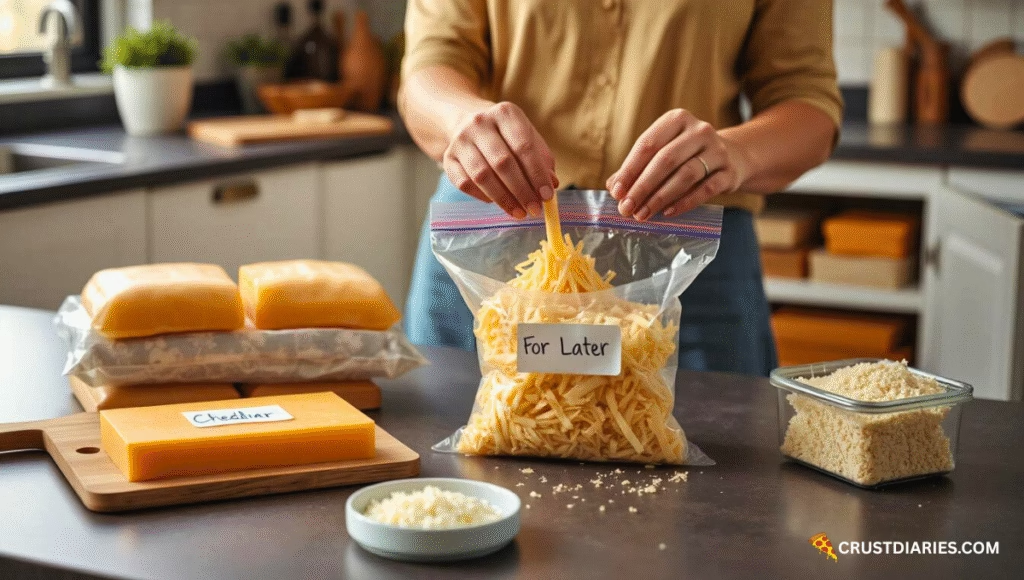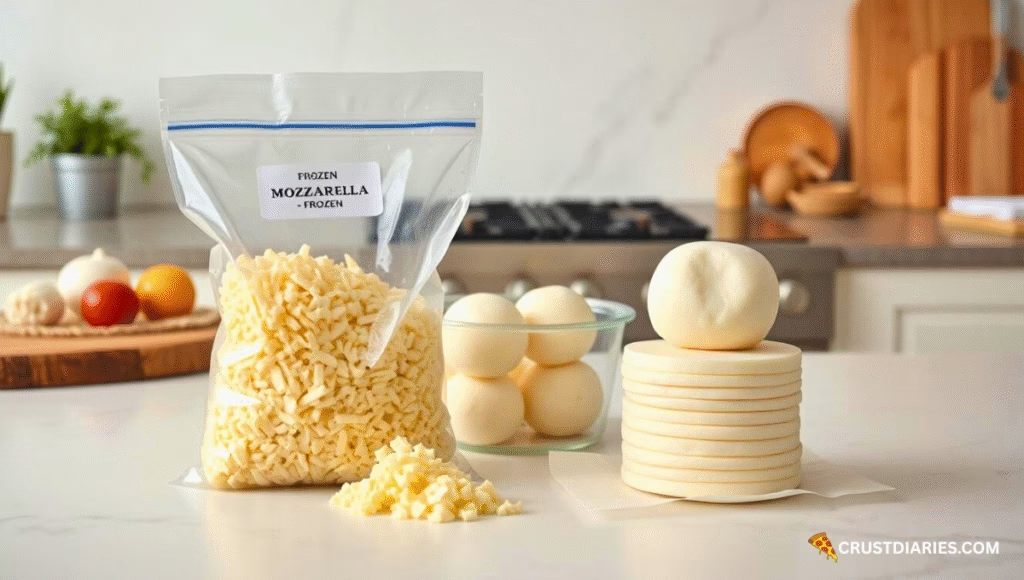If you’ve ever found yourself starting at that half- used blobk of cheddar or a bag of shredded mozzarella, wondering whether it’s safe to freeze- you’re definately not alone. We’ve all been there
The short answer is: Yes, You can freeze cheese
Not every cheese freezes the samwe way. Some cheeses come out completely fresh while other can lose their rubbery or chewy texture
Before we put cheese in the freezer, let’s first talk about which cheeses can handle the cold and how to store them properly
Curious about how other foods handle the freezer? Explore more of my kitchen-tested storage tips here
- How Long Can Pizza Last in the Fridge
- How Long Does Defrosted Chicken Last In The Fridge
- How Long Does Pepperoni Last in the Fridge
- How to Store Pizza Sauce Safely in the Fridge
🧊 Why Would You Freeze Cheese in the First Place?

You might be surprised at how many people freeze cheese, and for good reason
Here are a few everyday situations where freezing cheese makes total sense:
- Reducing food waste: Cheese can be pricey, and it hurts to throw it away
- Buying in bulk: If you catch a great deal at Costco, freezing helps you store it for months
- Meal Prepping: Shredded cheese ready to go? That’s a dream on busy nights
- Long-term storage: perfect if you don’t use cheese daily but want to keep it on hand
Freezing isn’t just about saving space or time– it’s about saving flavor and money
🧀 The Best Cheeses to Freeze

When it comes to freezing cheese, not all cheeses are created equal. There are some types of cheese that can be frozen easily and beautiful without any changes, while others suffer from loss of texture
Here’s a list of winner – cheeses that freeze like champions:
Cheddar

- One of the most freezer- friendly cheeses. Whether it’s sharp, mild, or extra mature, cheddar freezes well. it might become a little crumbly after thawing, but the taste stays rich and satisfying
Mozzarella

- Mozzarella is a freezer’s best friend- especially if you love pizza. it melts just as beautifully after thawing, making it perfect for toppings, lasagna or cheesy casseroles
Swiss, Colby, and Monterey Jack

- They are called semi- structured cheeses bacause they retain their texture flavor and texture well. they are easy to slice and melt
Parmesan and Romano

- This cheese has low moisture content. When this cheese is frozen,its shape changes it can be easily made into pistachios and soul after being taken out of the freezer
Gouda and Provolone

- Both freeze well if you plan to use them for cooking or sandwiches. just aviod using thawed slices for cheese boards– the texture can get slightly dry
Pro Tip: Always freeze cheese first if you plan to cook or melt it later, If there is even a slight loss in its texture, you will not notice it after melting it
🚫 Cheeses You Should Avoid Freezing
Now for the tricky part. Some cheeses just don’t like the cold.
These don’t freeze well because of their high water or fat content, which separates during freezing and thawing:
Brie and Camembert
- After melting this cheese, it becomes creamy, granular, and watery. if it must be frozen, use it in cooked dishes. Don’t spread it on crackers
Ricotta, Cottage Cheese, and Cream Cheese
- This is a good and moist cheese. Once it freezes, it loses its smooth texture the butter and water combine to form 1211
Goat Cheese (Fresh)
- This is a fresh goat cheese that dries out after breaking. But due to the low humidity this cheese can survive freezing
Feta
Most of you can easily freeze feta. it becomes much more crumbly on the inside and loses its flavor and shine
In short: The softer the cheese, the worse it is
🧂 How to Freeze Cheese
Freezing cheese is not a difficult process, but small steps can improve quality
Here’s how to do it right:
1. Decide the Form
- Try to freeze cheese in the form you intend to use it later, Slices and blocks freeze best because they thaw fairly quickly
2. Wrap It Well
- Air is the enemy of cheese, so wrap it tightly in freezer paper or plastic wrap to protect it. Then place it back in the freezer bag
Extra tip: Remove as much air as possible before sealing.
3. Double Protect for Long Storage
- If you want to store cheese for a long time, you can keep it in airtight containers and then use a vacuum sealer
4. Label Everything
- Write down the cheese type and the freezing date. Most cheeses stay good for up to 6 months, but for best quality, use them within 2–3 months.
5. Freeze Fast
- Try to place the cheese towards the back of the freezer because that’s where it gets coldest. This helps it freeze quickly and retain its flavor
❄️ How to Thaw Cheese Without Ruining It
Thawing cheese and doind it corredtly is just as important as freezing it correctly
- Move to the Fridge: Always remember to never melt cheese on the counter. Set the temperature in the refrigerator to the same temperature as this helps retain moisture for more than 24 hours and prevents bacteria from growing
- Keep It Wrapped: Never open it while it is being thawed, as keeping it closed greatly in preventing condensation and sogginess
- Use It Cold for Grating or Melting: Frozen cheese grates easily, Perfect fot toppings before cooking
When you cook it and feel a little crumbling, It’s completely normal and it won’t affect the taste once cooked
🧠 What Happens to Cheese When It’s Frozen?
Here’s the science behind it:
After cheese sets, The water inside it forms crystals, these crystals can destroy the structure of the cheese, Especially the fat and protein which can cause changes in the texture
- Hard cheeses: Cheddar and parmesan cheeses have less water content, so they freeze better without changing their texture
- Soft cheeses : Brie and ricotta are soft cheeses and contain a high amount of rennet, which can both spread and break up their cream
The cheese that is frozen may feel a little dry. But that’s not a problem it’s perfectly fine and flavorful for dipping
🍕 How to Use Frozen Cheese
When cheese is frozen and thawed, you can use it in a variety of delicious ways
- 🥣 In soups and sauces: Melt cheddar or swiss sauce into a creamy soup
- 🍕 On pizzas or lasagna: Mozzarella can melt in the freezer and no one will ever know
- 🥪 In sandwiches or omelets: Add melted cheese or grilled cheese to breakfast wraps
- 🧆 In casseroles or baked dishes: Can be used straight from the freezer no need to thaw
- 🧁 In baking: Frozen cheese works like magic whenever the cheese is melted or cooked
Basically, anywhere you cook or melt cheese, frozen cheese works like magic.
🧾 Frequently Asked Questions (FAQs)
1. Can you freeze shredded cheese?
- Yes, shredded cheese freezes better than blocks. Just take it out of the freezer and sprinkle it directly on your dish no need to thaw
2. How long can cheese stay frozen?
- It can generally be used for up to 6 months. For its best taste and texture, use it within 3 months
3. Can you refreeze cheese once thawed?
- It is not generally allowed because refreezing can change its texture, making it dry and rubbery
4. Does frozen cheese taste different?
- Some cheeses may taste a little dry, But you won’t notice any difference in cooked foods
5. What’s the best way to store thawed cheese?
- Keep it in the fridge in a sealed container and use it within 3-5 days
🧡 Final Thoughts
Freezing cheese is a simple kitchen trick that can save you time, money, and unnecessary waste.
The secret is knowing which cheeses to freeze and how to store them right. Hard cheeses like cheddar, mozzarella, and parmesan are your best bet. Avoid freezing soft, creamy varieties unless you plan to cook them later.
So next time you find yourself with extra cheese — don’t toss it out. Wrap it, label it, and freeze it. Future-you (and your next pizza night) will thank you.
Because honestly, life’s too short to ever run out of cheese





Pingback: How Long Can Pizza Last in the Fridge?[USDA+Expert Tips]
Pingback: California Gourmet Pizza: Fresh & Creative Toppings Ideas